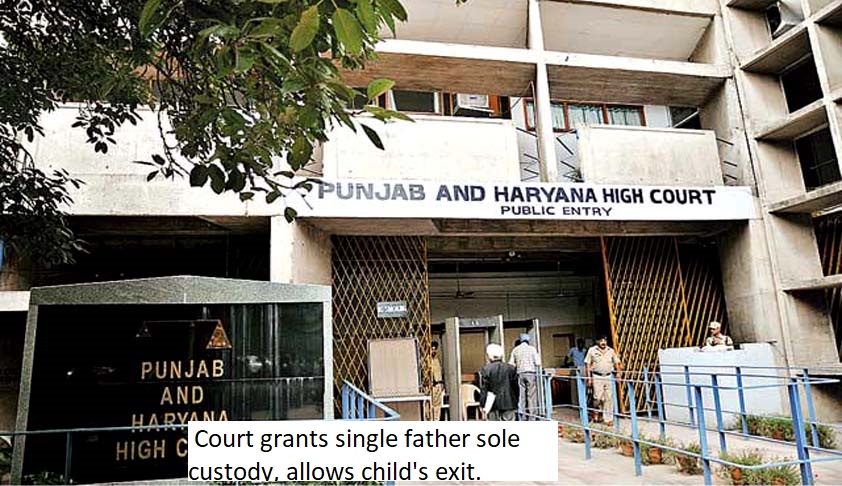


The Punjab & Haryana High Court recently adjudicated a habeas corpus plea, rendering a decision that conferred sole guardianship upon the biological father, petitioner no 2, for his surrogate child, petitioner no 1. In a legal pursuit before Justice Anupinder Singh Grewal, petitioner no 2, residing in Australia, sought to establish himself as the exclusive legal guardian of his 4-year-old surrogate child. The catalyst for this legal entanglement was the rejection of the child's visa application by the embassy, attributing it to the perceived ambiguity in surrogacy laws pertaining to single parents until 2021. A court decree, it was argued, was indispensable to navigate this legal quagmire.
Justice Grewal, in granting relief to the petitioners, articulated a principle that placed the welfare of the child above the intricacies of legal formalities. He expressed that in the realm of parens patriae jurisdiction, the court's duty is to prioritize the child's best interests, acknowledging the dynamic nature of the law. Citing the precedence set by Indian courts even before the enactment of the Surrogacy (Regulation) Act, 2021, the judge referred to the case of Baby Manzi Yamda v Union of India (2008). This precedent directed the Central Government to expedite passport issuance for a surrogate child embroiled in a matrimonial discord between biological parents, recognizing the diversity of prospective parents, including single males or male homosexual couples.
Further reinforcing the court's flexibility in custody matters involving minors, the judgment drew on the Supreme Court's decision in Nil Ratan Kundu v. Abhint Kundu (2008). The court underscored that it is not bound by statutes, rigid procedural norms, or precedents when addressing custody cases; rather, it must approach such matters with a humane touch, considering the human dimensions involved.
The petitioner, the surrogate child born in 2019, had entered into a surrogacy agreement with the surrogate mother, aiming to bring the child to Australia as a permanent resident. Despite possessing a valid Indian passport, the Australian Embassy withheld the child's visa, asserting that the surrogacy arrangement with a single commissioning parent created legal uncertainties under Indian law.
To navigate this bureaucratic impasse, the petitioners were directed by embassy authorities to obtain a court declaration affirming petitioner no 2's full legal custody, the right to remove the child from India, and the authority to determine the child's residence. Additionally, a declaration confirming the absence of legal rights from other parties involved in the surrogacy arrangement, including the egg donor, was mandated.
Crucially, the court took note that neither the surrogate mother nor her husband contested custody, explicitly disavowing any intention to assert custodial or parental rights over the petitioner in the future.
Emphasizing the paramount importance of the child's welfare in cases involving their rights, the court invoked parens patriae jurisdiction, a legal concept where the court acts as a guardian for those unable to protect their interests. This approach was aligned with the Supreme Court's stance in Vivek v. Romani Sir (2017), highlighting the child's best interest as the foremost consideration.
Justice Grewal also invoked the International Bill on Human Rights, citing the Universal Declaration of Human Rights, 1948, the International Covenant on Civil and Political Rights, 1966, and the International Covenant on Economic Social and Cultural Rights, 1966. These instruments recognize procreation and family as fundamental human rights, with states obligated to safeguard these rights.
Addressing concerns about the Surrogacy (Regulation) Act, 2021, the court clarified that its provisions wouldn't impede the sought declaration. The Act's prospective application from January 2022, and the exemption for existing surrogate mothers, affirmed the court's authority to address the matter.
Finally, the judgment underscored the court's commitment to prevent a scenario where the child might be abandoned or left to fend for themselves. Recognizing the single parent's capacity to provide education, material comfort, and moral support, the court concluded that the child's education and upbringing were pivotal not only for the child's future but also for the nation.
In conclusion, the Punjab & Haryana High Court's decision reflected a nuanced consideration of legal complexities, international human rights principles, and a steadfast commitment to the welfare of the child, ultimately affirming the single father's right to serve as the sole guardian of his surrogate child.
TAGS: Punjab & Haryana High Court Habeas corpus Sole guardianship Biological father Surrogate child Visa refusal